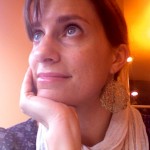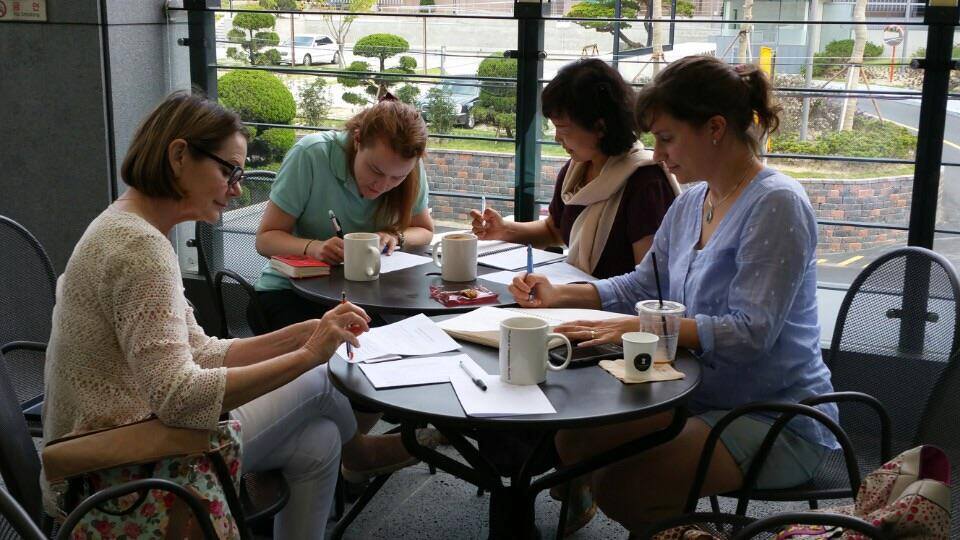 by Josette LeBlanc
by Josette LeBlanc
Something powerful happens when teachers gather to talk about their teaching. I’m not referring to gathering at a conference or a weekend workshop, although these provide their own kind of inspiration. I’m referring to teachers who voluntarily meet on a regular basis to discuss their journeys in learning and teaching. In such a setting, a quality of confidence and community arises that provides individual members with the sustenance needed to keep teaching another day. Such gatherings have been happening all across Korea since 2011 with teachers in Seoul, Gwangju, and Daegu meeting at their respective Reflective Practice Special Interest Groups (RP SIGs) to share a better understanding of their teaching.
Since the formation of the Daegu group in 2012, I’ve often been asked what’s involved in creating and maintaining a reflective practice group. Upon the inception of our group, I wrote a post (Our Reflective Community) which partially answered this question, but its revision has been long overdue. It’s my hope that this new post will provide a useful roadmap for anyone interested in starting a group in their part of the world.
![[Bryan Hale (standing), co-coordinator of the National KOTESOL RP SIG and Gwangju RP SIG, facilitates a meeting in Daegu.]](https://itdi.pro/blog/wp-content/uploads/2016/07/13595592_10157052003855375_1221025012_n.jpg)
Why have a reflective practice group, and what is it anyway?
In the first edition of the iTDi Reflective Practice blog series, Zhenya Polosatova defines reflective practice as it relates to teaching as a way “to review one’s professional beliefs and values and, in this way, shape and develop a unique teaching style or manner.” A reflective practice group brings this practice into a community. In this community, teachers analyze teaching and learning experiences with the aim of understanding, altering, and improving their approach. Whereas teachers may only have had their own mind as a soundboard when reflecting alone, now they have the benefit of learning from the experiences of many colleagues.
Who comes to the reflective practice group meetings?
At each meeting you’ll find teachers from various contexts (i.e. private academies, universities, public schools, teacher training programs, etc.) who have a desire to develop their self-awareness and evolve their teaching. Since membership is voluntary, motivation to learn and grow seems to be quite high, especially since they gather on the weekends. We all know how precious a teacher’s weekend is!
Volunteer coordinators usually organize meetings. This can be an individual or group endeavour. The coordinators may also act as the meetings’ facilitator, though I encourage the idea of asking members to run meetings as well. This helps distribute the responsibilities more evenly, and also promotes a sense that everyone has an important role to play in the community.
How do you run a reflective practice group?
A meeting usually starts off with an icebreaker. This is a good way to acquaint newcomers with people they may soon start divulging their most challenging experiences with.
In essence, a meeting is much like Chris Mares describes in his last iTDi post: we focus on a question or topic; we may record what we reflected on; and then we implement and review the results of the reflection.
This implementation and review may happen at the end of a meeting when each member creates a goal to work on until the next meeting. At some point during the follow-up meeting – either after the icebreaker or with ample time at the end of the meeting – members review their success or challenges with their goal.
Having a tangible model of reflection can aid this implementation and review. Referring to Zhenya’s post again, she shares an approach that can serve as a foundation for group meetings: the Experiential Learning Cycle. The cycle provides a concrete way to talk about reflection. Such a solid model can be valuable since it is easy for group discussions to get off track. The cycle helps members to come back to the intention of the group, which is to understand teaching at a deeper level.
As valuable as it is for members to discuss the content of their experiences, it is equally as important to help them find avenues to explore this content. For his post in this blog series, Stewart Gray, who is the coordinator for the Seoul RP SIG, shares a technique for reflection: reflective journaling. If this were the topic of the meeting, members might set a goal to journal during the month, and then share their experience at the following meeting.
Other approaches to these meetings may involve reading through articles or books on reflective practice, and doing personal reflections around this. The possibilities are endless. The important point is to stay open to what your community needs and go from there. 
When do you hold your reflective practice group meetings?
Members preferably meet once a month and the duration is up to your group. The Daegu group meets for two hours every third Sunday of the month. This seems to be enough time, though we’ve been known to go over two hours when the discussion gets juicy.
Where do you meet?
The location can be summed up in three Cs: centrality, comfort, and coffee (or tea, of course). It’s important to meet where it’s easy for the majority of people to travel to. Also, a private space is better than a public one, especially when discussions become a bit more personal. Finally, reflection absolutely requires refreshments.
————
I hope this roadmap was helpful. If I missed anything, please leave a message in the comments below. I also recommend exploring Linda-Marie Koza’s group in San Francisco, USA, and Anna Loseva’s group in Tokyo, Japan, for different examples of how reflective practice groups are run.

